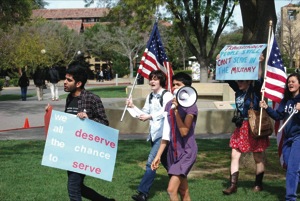
Just recently, March 4, I was up at Stanford University with the Stanford Students for Queer Liberation. I protested along with the group against an ROTC program returning to Stanford.
There are arguments for and against ROTC’s returning to colleges and universities that have cited that the military’s policy, mandated by federal legislation passed by congress in 1993 (commonly referred to as Don’t Ask, Don’t Tell), as a reason why ROTC programs shouldn’t return to these schools. GetEQUAL’s arguments against ROTC’s returning to college campuses that have cited their college diversity policies for why ROTC programs shouldn’t be at the schools are what I’m calling the “three-plus-one” arguments.
There are three-plus-one reasons why ROTC programs shouldn’t return to college campuses. The three reasons are as follows:
One: As currently proposed, implementation of open service for lesbian, gay and bisexual (LGB) servicemembers won’t include an explicit anti-discrimination policy.
Two: As currently proposed, implementation of open service for LGB servicemembers won’t include partner benefits – such as healthcare coverage, exchange and commissary benefits and partner relocation costs for change of duty station moves.
Three: Repeal of DADT will not result in transgender people being able to serve openly in the military services.
And the “plus one” reason is this: It’s premature to welcome back ROTC programs when lesbian, gay and bisexual servicemembers are still under DADT rules, and are still not able to as yet serve openly. Discussion of whether ROTC programs should return to college campuses should wait until LGB servicemembers are able to serve openly, not just on a promise they will be allowed to serve openly soon.
OutServe’s J.D. Smith has outlined why he believes ROTC programs should return. His basic reasoning is that LGB people in the military will give young LGB people a chance to join and will change the military mindset from the inside.
On Thursday, March 3, the President of Harvard University announced that Harvard and the U.S. Navy had an agreement to bring an ROTC program back to Harvard. The Harvard Crimson reported this about what Rep. Barney Frank believes about the return of an ROTC program to Harvard:
“Frank voiced his support for the return of the Reserve Officers’ Training Corps at Harvard, despite concerns from students and activists about a policy barring transgender individuals from military service.
“‘I would reinstate ROTC at Harvard,’ he said. ‘If you hold out on perfection, your ability to achieve full success diminishes.’”
Monica Helms, the president of the Transgender American Veterans Association (TAVA) had this to say about Harvard’s decision:
“I brought up the fact that the ROTC will still violate Harvard’s non-discrimination policy, because of the three items (Sandeen) mentioned. (Phil Reese of Bilerico’s Same-Sex Sunday podcast) then pointed out that any other organization that is formed on Harvard’s campus, including frat and sorority houses, have to strictly follow Harvard’s non-discrimination policy or they’re gone. Why is the ROTC different?”
I can tell you how many in the transgender subcommunity of the LGBT community are going to respond to Harvard’s, OutServe’s and Rep. Frank’s position on ROTC programs. What we are going to hear is that the institutional leadership of the LGB portion of the LGBT community has again traded away gender identity related political issues to promote LGB political issues. And, we’re going to hear transgender voices speaking in an angry tone about this.
The Stanford Students for Queer Liberation have taken a position that isn’t popular with a significant number of LGB students in the LGBT community; it may not be popular with the majority of LGB people period who just want to call repeal of DADT a community win, and move on to other issues. I get that.
But if the Stanford Students for Queer Liberation hold an arrestable direct action on this issue, you can just about guarantee that I will get arrested with those student protesters. Ordinary equality is just that: an incomplete victory isn’t a complete win for ordinary equality. My feeling is that the LGBT community shouldn’t behave in a way that sends a message that it is.










